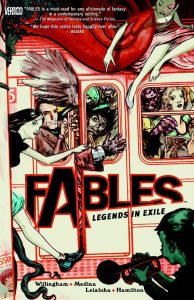 Another new graphic novel series? I can assure you, it’s all true. For, y’know, extremely relative values of new that seem in fact to reflect things published years ago. My initiation into the format only occurred within the last couple of years[1], though, so running behind kind of goes with the territory. The Fables series got on my radar via Amazon recommendations, much as with Dorothy and for that matter Ex Machina. Of my recent new series, this is certainly the one I’m the most satisfied with.
Another new graphic novel series? I can assure you, it’s all true. For, y’know, extremely relative values of new that seem in fact to reflect things published years ago. My initiation into the format only occurred within the last couple of years[1], though, so running behind kind of goes with the territory. The Fables series got on my radar via Amazon recommendations, much as with Dorothy and for that matter Ex Machina. Of my recent new series, this is certainly the one I’m the most satisfied with.
The idea of storybook characters all jumbled together in New York, while obviously cool enough to take the risk on (since I did buy it), seemed potentially fraught with peril. Apparently, they all come from different worlds (which I will choose to call dimensions) that were one after another attacked by an Adversary (who is thusfar shrouded in mystery), and by the time they realized that there was true danger afoot, they had no remaining options but to flee from their worlds to this one, which the Adversary has no apparent interest in. Being the stuff of fables, they’re immortal, so while they all came from different storybook dimensions to start with, they’ve had several hundred years on earth as Legends in Exile to properly mingle and form interrelationships. The upshot of all that background being that the interactions were rich and often funny, with distaste, attraction, working relationships, and even unlikely friendships all laid bare. The book was equal parts Storybook Melrose Place and Fable Noir.
Which raises my other extreme like for the book. The mystery was, if moderately simple, plotted quite well and made good use of the setting. Bigby Wolf[2], the sheriff of Fabletown, is confronted with murder most foul when Jack[3] reports that his girlfriend Rose Red is missing and her apartment covered in blood. Once Deputy Mayor Snow White[4], the victim’s sister, insists on including herself in the investigation and the rich and powerful Bluebeard is fingered as a potential suspect, all the trappings of a Humphrey Bogart noir are in place, and the only thing left to do is lean back and enjoy the ride. There are a lot of possibilities for the series, since the available characters cast such a wide net. I figure, if I get more volumes in the noir vein, well and good, and if not, the creators have already proven they have the chops to do good things with the premise, at least.
[1] Well, except for Sandman, which I’m prepared to call a special case.
[2] That name still gives me the giggles, even now.
[3] of “and the Beanstalk” fame
[4] whose surpassing loveliness is storied… er, whose fabled… Dammit. The point is, she’s a looker with legs that just wouldn’t quit and a smoldering fire in her eyes that told me she’d seen enough of the world to know that it wasn’t as pretty as the stories said it would be.
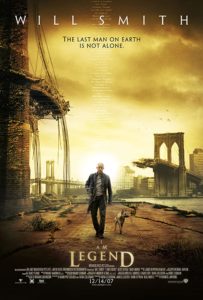 Far back in the mists of Delirium’s history (er, the site, not the girl), I read
Far back in the mists of Delirium’s history (er, the site, not the girl), I read 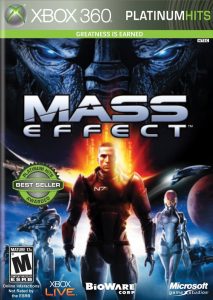 One sign of an extremely good video game is that it would be almost easier to describe it as a movie and leave out the game elements entirely. Well, okay, that may not be true. But if the reason you want to leave out the game elements is that they were so seamless and non-intrusive that you only very occasionally even felt like you were playing something instead of watching it and influencing the outcome, that would be good. It would also be a good sign if your father, no stranger to games even if he’s not the gamer type, were to ask you after watching the last 15 or 20 minutes of the game to clarify that it was in fact a game, and not a movie.
One sign of an extremely good video game is that it would be almost easier to describe it as a movie and leave out the game elements entirely. Well, okay, that may not be true. But if the reason you want to leave out the game elements is that they were so seamless and non-intrusive that you only very occasionally even felt like you were playing something instead of watching it and influencing the outcome, that would be good. It would also be a good sign if your father, no stranger to games even if he’s not the gamer type, were to ask you after watching the last 15 or 20 minutes of the game to clarify that it was in fact a game, and not a movie.
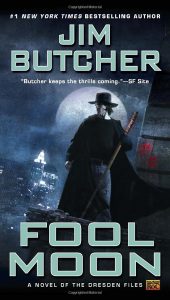 I cannot decide if my love for the Harry Dresden books comes from their being objectively awesome, or from them being in such sharp contrast to the Anita Blake books. I mean, sex happens, but it’s dealt with tastefully, with soft-focus lensing and quick cut-aways, and far more importantly, it is not the constant focus of Harry’s regular magic-wielding, mystery-solving lifestyle. Which leaves him some time to think about wielding magic and solving mysteries. Is the prose with which he wields his magic, the world-building in which he solves his mysteries, the characterizations that come into play when he interacts with the other, er, characters really any better than most books I read? I’m going to guess that probably not, and yet I could grab the next three that I currently own and read them all in a row without getting the least bit tired of it. Um, unless the plot suddenly changes into a situation where he’s banging the vampire chick Bianca like a drum and his cop friend starts hating him and he wallows in angst by taking up with a werewolf pack? Don’t be sexy, Harry! It’s not worth it!
I cannot decide if my love for the Harry Dresden books comes from their being objectively awesome, or from them being in such sharp contrast to the Anita Blake books. I mean, sex happens, but it’s dealt with tastefully, with soft-focus lensing and quick cut-aways, and far more importantly, it is not the constant focus of Harry’s regular magic-wielding, mystery-solving lifestyle. Which leaves him some time to think about wielding magic and solving mysteries. Is the prose with which he wields his magic, the world-building in which he solves his mysteries, the characterizations that come into play when he interacts with the other, er, characters really any better than most books I read? I’m going to guess that probably not, and yet I could grab the next three that I currently own and read them all in a row without getting the least bit tired of it. Um, unless the plot suddenly changes into a situation where he’s banging the vampire chick Bianca like a drum and his cop friend starts hating him and he wallows in angst by taking up with a werewolf pack? Don’t be sexy, Harry! It’s not worth it!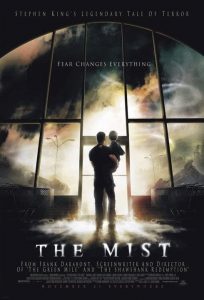 On Monday, I spent most of the day driving around Austin digging through a few of its Half-Price Bookses, wishing I had an excuse to drop by the Alamo Drafthouse, failing to find any new Hawaiian / hipster button shirts for work, and just generally enjoying the rhythm of the town. Even over-trafficked as it is these days, if you don’t get on 35 you at least get to look at all the Austin people and landmarks while you’re stuck in your car not going anywhere. In addition to all that, though, everything was covered by a dense layer of fog all day. I mean, not the kind where the visibility is measured in feet, but probably the kind where it’s measured in hundreds of feet. When you add up all of these factors, it becomes clear that my viewing of the latest Stephen King adaptation,
On Monday, I spent most of the day driving around Austin digging through a few of its Half-Price Bookses, wishing I had an excuse to drop by the Alamo Drafthouse, failing to find any new Hawaiian / hipster button shirts for work, and just generally enjoying the rhythm of the town. Even over-trafficked as it is these days, if you don’t get on 35 you at least get to look at all the Austin people and landmarks while you’re stuck in your car not going anywhere. In addition to all that, though, everything was covered by a dense layer of fog all day. I mean, not the kind where the visibility is measured in feet, but probably the kind where it’s measured in hundreds of feet. When you add up all of these factors, it becomes clear that my viewing of the latest Stephen King adaptation,